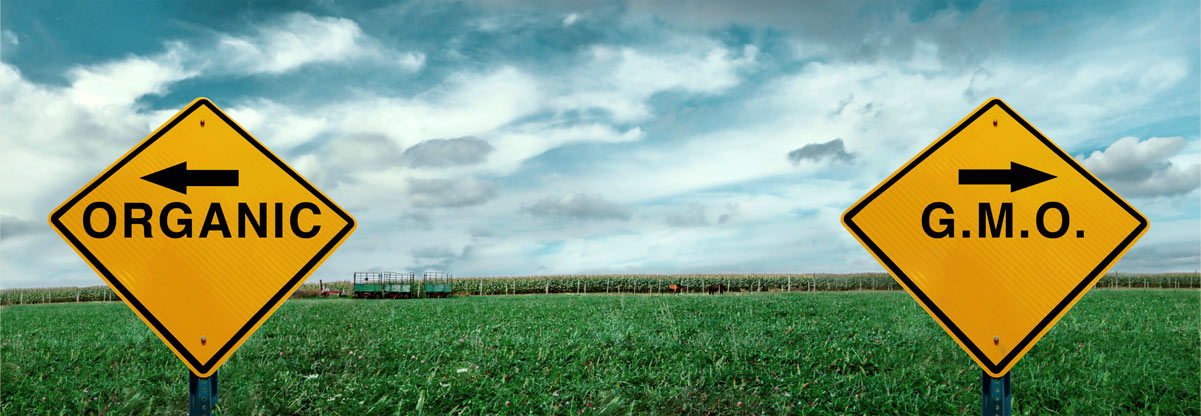
Source: http://non-gmoreport.com/articles/coexistence-between-gmo-and-organic-wont-work-until-they-stop-firing-at-us/ Permission: This material has been reproduced in accordance with the University of Saskatchewan interpretation of Sec.30.04 of the Copyright Act.
Overview
We are nearly at the end of this course and it’s time for you to more deeply explore what you’ve learned by doing some research and presenting your interpretation of important agricultural issues. This module explores five controversial issues in agriculture. It gives you a chance to more deeply compelling issues that will be important for your future in the agriculture industry. I will introduce each topic and briefly describe how to interpret the issues using the economic concepts we’ve discussed in the former modules, as well as in the context of sustainability.
We will also review a new framework for critical thinking about these topics (and any others for that matter). As you likely already know, there are always two sides to every story, at least two perspectives, and often disagreement as to what’s effective and efficient, who are the winners and losers, who benefits and who doesn’t. This will be your chance to explore these issues in depth and apply what you’ve learned.
This module also contains the first mandatory assessment – an online debate in which everyone must participate. You have seen debates on TV; you have informal debates or arguments about things for which you are passionate. This is no difference other than having to consider both sides. There will be an online forum for you to post your arguments both for and against an issue, and an opportunity to rebut arguments already posted. More details to follow!
Learning Objectives
Upon completion of this module, you will be able to:
- Articulate key arguments used in formal debating.
- Discuss the key economic issues associated with current agricultural problems and opportunities.
- Identify relevant economic theories associated with current events.
- Evaluate the sustainability of agricultural issues from new perspectives using SPLEEEMR.
- Inform the discussion among your colleagues on the following topics:
- Can the current agriculture industry feed the growing human population?
- Innovation - Genetically Modified Organisms (GMOs) in food – good or bad?
- The rise in demand for organic products – sustainable or not?
- Should our food be safe?
- With or without hormones and antibiotics?
Module Instructions
- Read the module.
- Review past modules to refresh your knowledge regarding relevant economic theories for each topic.
- Read links within this module.
- Prepare arguments for a formal online debate – this assessment is mandatory.
Required Readings
Avery, A., & Avery, D. (2007, December 7). The environmental safety and benefits of growth enhancing pharmaceutical technologies in beef production. The Cattle Site. Retrieved from: http://www.thecattlesite.com/articles/1240/the-environmental-safety-and-benefits-of-growth-enhancing-pharmaceutical-technologies-in-beef-production/
Bager, S., Campbell, B., Holt, L., & Vermeulen, S. (2016). Big facts on climate change, agriculture and food security. CGIAR Research Program on Climate Change, Agriculture and Food Security (CCAFS) and Future Earth. International Center for Tropical Agriculture. Retrieved from: https://ccafs.cgiar.org/bigfacts/#theme=food-security
European Commission Joint Research Centre. (2016, November 28). Looking into the future of European food safety and nutrition policy. Phys.org. Retrieved from: http://phys.org/news/2016-11-future-european-food-safety-nutrition.html
Haney, S. (2016, March 16). Selling beef to A&W is not betrayal. realagriculture. Retrieved from: https://www.realagriculture.com/2016/03/selling-beef-aw-not-betrayal/
Harmon, A. (2013, August 24). Golden Rice: Lifesaver? The New York Times. Retrieved from: http://www.nytimes.com/2013/08/25/sunday-review/golden-rice-lifesaver.html
Maghari, B.M. and Ardekani, A.M. (2011, Jul-Sept). Genetically modified foods and social concerns. Avicenna Journal of Medical Biotechnology, 3(3): 109-117. Retrieved from: https://www.ncbi.nlm.nih.gov/pmc/articles/PMC3558185/
McKenna, N. (2013, November 14). Ranchers have a beef with new A&W hamburger campaign. CBC News. Retrieved from: http://www.cbc.ca/news/canada/edmonton/ranchers-have-a-beef-with-new-a-w-hamburger-campaign-1.2426659
Organic Centre. (2007, May 1). Growth hormones fed to beef cattle damage human health. Organic Consumers Association. Retrieved from: https://www.organicconsumers.org/scientific/growth-hormones-fed-beef-cattle-damage-human-health
Press, J. (n.d.). Is it worth it to buy organic? Oprah.com. Retrieved from: http://www.oprah.com/health/Is-Organic-Food-Worth-It
Wesseler, J., & Zilberman, D. (2014). The economic power of the Golden Rice opposition. Environment and Development Economics, 19(06), pp. 724-742.
Key Terms and Concepts
- Debate
- Food safety
- Food security
- GM food
- Growth hormones
- Organic agriculture
- Price premium
- SPLEEMR
- Supply chains
